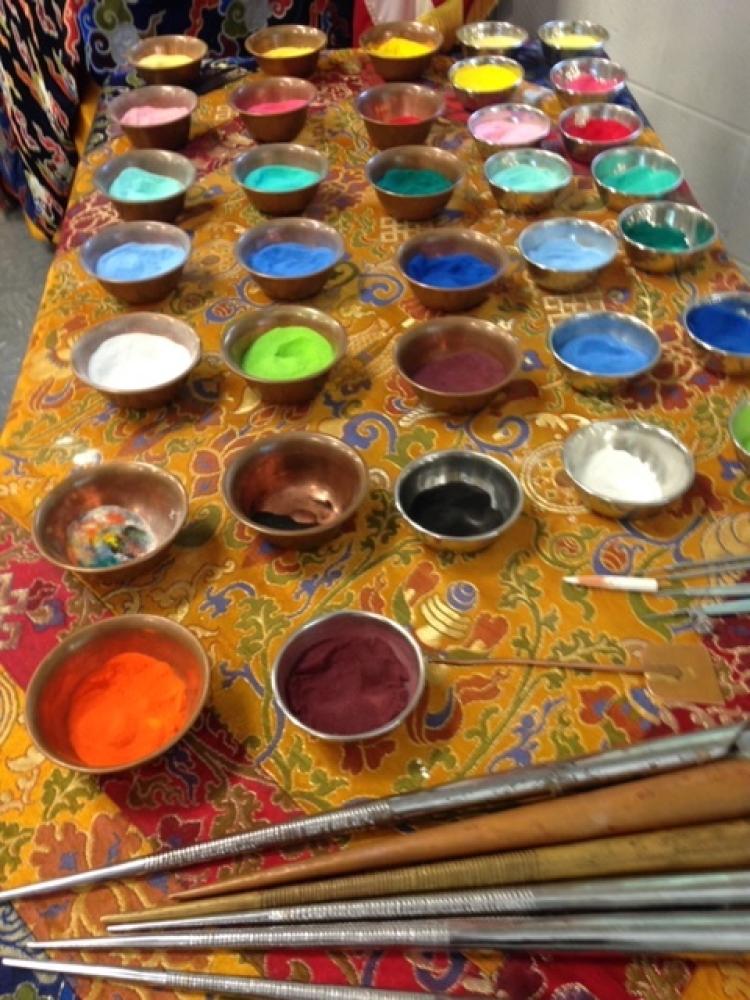I spent a great deal of time as a child sitting on the bluff overlooking Lake Erie, staring across to Canada, dreaming of what it must be like to see other lands and to live the way other people lived.
But most of all, I spent the time thinking about my own life and its future.
The problem was that I didn’t know then the difference between a dream and a plan. A plan is a strategy; a dream is an idea.
The distinction between the two is subtle but determining. The fact is that without dreams, no plans are possible.
Whatever happens to the pastiche of dreams that live and change and fade away in the young me—a desire to see the world, or fly an airplane, or be an athlete— it is the dream that dominates my life that really counts.
Dreams are not plans. Dreams are destinations toward which we bend our lives, not possibilities unfulfilled. The dream of becoming the fullness of myself drives me from yesterday to tomorrow—not stuck in memory, impervious to today, an invitation to a future yet in process. Dreams are the life blood of becoming. When I stop dreaming, a level of what it means to be alive ends in me, as well.
A plan is within my control; a dream is hope in the mist. I hope to go around the world; I hope for an education, a job, someone to love, something to save me from what is. Dreams show me the quality of my ideals. It is the willingness to dream on, to dream higher, to pursue a dream that enables me to live beyond “what is” for “what could be.”
In every dream lurks the bittersweet siren call of “perhaps,” and “if only,” and “because,” and “I must.” They carry me on angels’ wings from one time to another, however impossible either past or future may seem. But dreams are not certainties, they are the ideals by which we live our lives.
The difficulty with dreams is that if we suppress them, we may live to regret the present. The worst of all possibilities is to go through life mourning the dreams we never pursued.
At the same time, if we refuse to adjust our dreams to the reality in which we live, we may fail to see how much of what we want we have really achieved. The function of a dream is to give life a direction, not to give it pain. It is the difference between “I always wanted something like this...” and “I wish I had tried....”
It all depends on us.
Sunday, January 1: In South Pacific, one of the longest running Broadway musicals of all time, Bloody Mary sings “If you don’t have a dream, how you gonna have a dream come true?” It’s a life lesson far beyond the philosophy we have come to expect from the average musical. The truth is that it is the goals we nurture within us that determine the eventual quality of our lives. If we aspire to less than we can be, we will get exactly that.
Monday, January 2: Our dreams are lodged in our memories so that no matter how troubled life may be at any single moment, we can never forget that we are going in the direction of something more than whatever this is. Memory, the dreams of what can be, have kept people alive in every kind of captivity and degradation. “God gave us memories,” J.M. Barrie wrote, “that we might have roses in December.”
Tuesday, January 3: Dreams drive us beyond what is to what we seek. It is fanning our dreams, defining what we seek, that will eventually take us to where they are real.
Wednesday, January 4: Dream big but realize that every great hope is achieved one small step at a time along the way.
Thursday, January 5: The best of our memories are the life blood of our dreams: the smell of fresh bread, the sight of a fishing rod, the feel of a cheap, small trophy. They all measure the goodness of our lives, both past and present. Whatever it is that evokes contentment in us, it is precisely those things we most seek.
Friday, January 6: Our memories hold for us the images of every-thing we most desire in life, the specter of everything we most avoid.
Saturday, January 7: “We do not remember days, we remember moments,” Cesare Pavese tells us. It is the gemstone of singular memories that store in symbol for us the sum total of the real hopes and fears of our lives. It is out of such things that our dreams are shaped and reshaped.
Sunday, January 8: What we remember in life, and have learned from, constitutes the volume of wisdom in us. To the degree we find meaning in what we remember, to that degree we are wise as well as clever. To that degree every day is a better day for us.
Monday, January 9: No amount of intelligence learned in a classroom is equal to one ounce of wisdom distilled from my memories.
Tuesday, January 10: Imagination and memory are not the same things. Imagination is derived from memory. Because of what we remember, we either build a better world for ourselves or we replicate what we did not learn from in a sad past.
Wednesday, January 11: “The past is never dead,” William Faulkner wrote. “It is not even past.” But if that is true, then we never escape the past because it lives in us forever. But there is one thing we can do: We can refuse to allow it to go on controlling us. We can live into the dream of a better present because of it.
Thursday, January 12: The size of our future depends on the size of our dreams.
Friday, January 13: Our dreams are the path to a new kind of present. They not only show us what we seek, they show us what it will take to get there. Most of all, they make the length and difficulty of the journey worthwhile.
Saturday, January 14: It never hurts to dream of the desirable; it always hurts never to dream of it at all. Beyond where we are is the rest of us, the unfinished us, the incomplete us. It takes the dream of more to get us there.
Sunday, January 15: Some- times what we want to forget is as important to the creation of a new dream as anything we could possibly remember. As the essayist Montaigne says, “Nothing fixes a thing so intensely in the memory as the wish to forget it.”
Monday, January 16: Every dream that becomes a reality is the beginning of a new one.
Tuesday, January 17: Life is the pursuit of one dream after another until all the possibilities in us are exhausted and life takes on the shape we give it. Clearly, it is the dreams we make for ourselves that determine the life we live.
Wednesday, January 18: If our dreams of the future are born out of our past, then time is the seedbed of the future. It is what we have come from that charts the way to the future.
Thursday, January 19: It is important to remember, as Anne Morrow Lindbergh writes, “Duration is not a test of true or false.” Just because something in our lives has gone on and on for years does not mean that it must always be. Whatever is not good is up to us either to change or to learn to live with better than we have.
Friday, January 20: We so often mistake the nature of time. We act as if it were a line behind us when, as a matter of fact, it is the pool of life that is within us. It is what we draw from the pool of yesterday that will determine the choices we need to make to- morrow if tomorrow is to be better than the past.
Saturday, January 21: The past cannot be solved by pretending to forget it. There is no such thing. Time is a permanent mark on our souls. What is not permanent is the way in which we deal with it.
Sunday, January 22: If we assume that what we have been we must always be, we have forgotten—or never knew—the power of a dream to put new energy into making life new again.
Monday, January 23: To defer the dream of my life—to put off doing what needs to be done if I am ever to become the fullness of myself, to assume that there is time to do tomorrow what should have been done a lifetime of yesterdays ago—is to defy the natural process of life. It is also to deny the very purpose of my life. Simone Weil puts it this way, “Time does us violence; it is the only violence.”
Tuesday, January 24: We rush through life, we throw our dreaming times away or fill them to the brim with the mundane or the useless. And with them goes the opportunity to dream a better way to live the little time we have.
Wednesday, January 25: We fill time with things that rob us of the very time we covet to live life well. We forget to take the time to think, to stop, to dream, to breathe, to look, to try something new. “Killing time,” Karen Elizabeth Gordon says, “takes practice.”
Thursday, January 26: A visitor to the office of a very successful business saw a man sitting at a window, head back against the high leather neck rest of his chair, feet up on his desk, hands crossed on his chest, staring into space. “You see that guy there,” the visitor said. “He’s doing nothing but sitting around thinking.” The owner cast a sharp look at the visitor and then said tersely, “He better be. That’s what I pay him for.”
Friday, January 27: Absolutely nothing new could possibly happen in the world if it weren’t for its dreamers. So why do we put so much energy into insisting that people be busy all the time?
Saturday, January 28: We teach students to calculate, and compute, and memorize, and recite. When do we ever teach them to dream?
Sunday, January 29: When we take the time to wonder what life would be like if something common to it—like schools or banks or churches—disappeared, we are suddenly free to dream of living differently. Then, the question is an obvious one, Would that be better or worse?
Monday, January 30: When we don’t take time to dream about what we might want to do next in life, we are too busy to be alive.
Tuesday, January 31: A traveling salesman, seeing a farmer holding a large pig up to an apple tree to feed him an apple, stopped and asked, “Wouldn’t it save a lot of time just to pick the apple yourself and give it to the pig?” And the farmer replied, “Ah, don’t worry about it. After all, what’s time to a pig?” Efficiency and logic have never been what enabled us to see life differently, to imagine another way of being alive, to try what has never been tried before us, if for no other reason than to see if it works.
Let’s Share Our Thoughts
The following discussion questions, Scripture echoes, Journal prompts, and prayer are meant to help you reflect more deeply on The Monastic Way. Choose at least two suggestions and respond to them. You may do it as a personal practice or gather a group interested in sharing the spiritual journey. Once a month The Monastic Way staff will convene a Zoom conference where you can share your insights. Three times a year Sister Joan Chittister will join that Zoom conference to give more input and respond to your questions and ideas regarding one issue of The Monastic Way.
Discussion Questions
1. Reread Sister Joan’s comment for January 5. Make a list of memories that are the life blood of your dreams. What is it that “evokes contentment in you” and “measures the goodness of your life, both past and present.” You might want to share those life blood memories with another person.
2. Which daily quote in The Monastic Way is most meaningful to you? Why? Do you agree with it? Disagree? Did it inspire you? Challenge you? Raise questions for you?
3. After reading The Monastic Way write one question that you would like to ask the author about this month’s topic.
4. Joan Chittister uses other literature to reinforce and expand her writing. Find another quote, poem, story, song, art piece, novel that echoes the theme of this month’s Monastic Way.
5. The Harlem Renaissance poet Langston Hughes wrote about dreams, how important it was to have them and what happens to dreams suppressed or deferred:
What happens to a dream deferred? Does it dry up
Like a raisin in the sun?
Or fester like a sore––And then run?
Does it stink like rotten meat? Or crust and sugar over–– like a syrupy sweet?
Maybe it just sags
like a heavy load.
Or does it explode?
––Langston Hughes
Write an answer to the poet’s question: What happens to a dream deferred? Try to use an example from your own life.
Scripture Echo
When there is a prophet among you, I, God,
reveal myself to them in visions,
I speak to them in dreams.
—Numbers 12:6
How have you decided whether a dream—your dream or someone else’s—was a gift of God? What has been your sign that a dream was worth pursuing?
 Journal Prompts
Journal Prompts
Prompt 1. Here are a few statements from this month’s Monastic Way. Choose one that is most helpful to you and journal with it.
• It is the dreams that we make for ourselves that determine the life we live.
• Absolutely nothing new could happen in the world if it weren’t for its dreamers.
• The worst of all possibilities is to go through life mourning the dreams we never pursued.
Prompt 2: Spend a few minutes with this photograph and journal about its relationship to this month’s Monastic Way. You can do that with prose or a poem or a song or...
Prayer
We pray for the dreamers of this life, O God, for those persons who image new possibilities, who long for what others cannot perceive, who spin dreams of wonder and majesty in their minds. Defend them from ridicule and harsh criticism, from self-doubt and lack of faith in their dreams, and from abandonment of this call to make things new. Grant that from their dreams may come forth blessings for all humankind to enrich the quality of life and the wonderment of us all; in Christ’s name we pray. Amen.
—from Prayers of our Hearts in Word and Action, Vienna Cobb Anderson
JOAN CHITTISTER is an internationally known author and lecturer and a clear visionary voice across all religions. She has written more than 60 books and received numerous awards for her writings and work on behalf of peace and women in the church and in society.

 Artwork: by Mary Miller, OSB
Artwork: by Mary Miller, OSB




